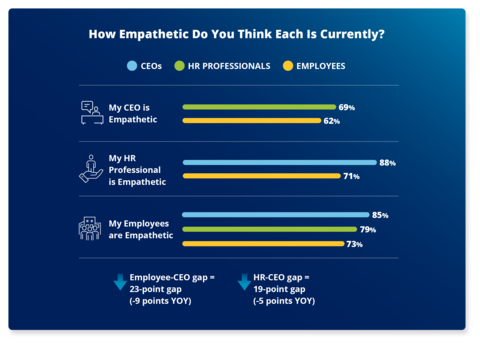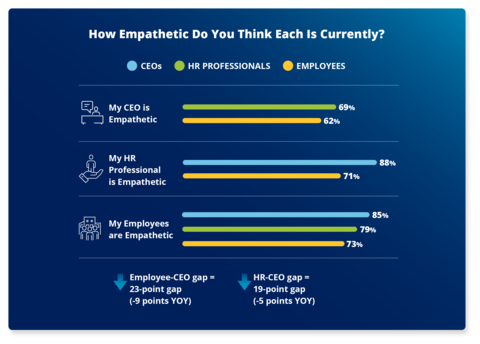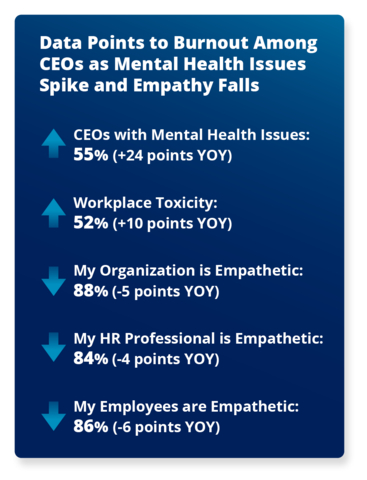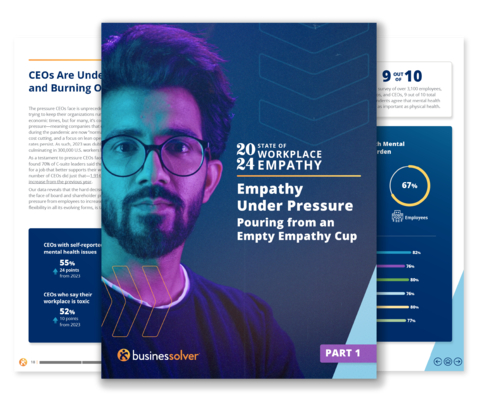DENVER--(BUSINESS WIRE)--Businessolver®, a leader in benefits and HR technology solutions, released initial findings from its 2024 State of Workplace Empathy Study which surveyed more than 3,000 employees, HR leaders, and CEOs.
Among the most alarming of the study’s findings is the discovery that many employees and CEOs appear to be suffering from higher rates of both mental health and workplace toxicity issues.
Self-reported mental health issues up 24 points among CEOs
One in two (50%) employees who participated in the Businessolver survey reported experiencing a mental health issue in the past year. Among CEOs, however, the percentage jumped to a staggering 55%, a 24-point year-over-year (YOY) increase.
“We commend the CEOs who took part in this study for approaching it with honesty and openness, particularly given the persistent stigma that surrounds mental health,” said Jon Shanahan, President and CEO at Businessolver. “The more leaders are in touch with and willing to share their own struggles, the greater opportunity for empathy across the organization.”
The survey found near 90% agreement across employees, HR, and CEOs that it’s important for senior leadership to openly discuss mental health issues to create a safe environment for other employees to follow suit. What’s more, 73% of employees (+11 points YOY) believe their manager emphasizes the importance of mental health, indicating a rising degree of empathy being executed at the supervisor level.
However, CEOs (81%), HR (72%), and employees (67%) all ‘agree’ or ‘strongly agree’ that companies view someone with mental health issues as weak or a burden.
Among non-leadership employees, women and the youngest workers seem to be suffering the most from mental health challenges. Sixty percent of female respondents indicated they had experienced mental health issues as compared to 40% of male respondents. Gen Z participants were almost twice as likely at 65% to report a mental health issue as compared to Boomers at 38%.
52% of CEOs and Gen Z say their workplace is toxic
As for workplace toxicity, many CEOs and employees agree on its pervasiveness. Forty-two percent of total respondents agree that their workplace is toxic with both 52% of CEOs (+10 points YOY) and Gen Z saying the same.
The study found a strong correlation exists between mental health issues and workplace toxicity: Employees who view their workplace as toxic are 47% more likely to also cite a mental health issue. Additionally, the more flexibility an employee has, the less likely they are to view their company culture as toxic. Just 24% of remote workers cited toxicity within their organization.
Additional key findings
The above findings are just some of the hundreds of data points on empathy, mental health, and workplace toxicity included in the extensive 2024 State of Workplace Empathy Study. Other stand-out findings include:
-
CEOs admit facing challenges to demonstrating empathy. Sixty-five percent (+17 points YOY) say they feel intimidated by their coworkers, 72% say they will be challenged on decisions if they use empathy, and 69% say being empathetic will “make me a pushover.”
- A strong correlation exists between the perceptions of empathy and toxicity. Sixty-three percent of employees who cite their workplace as toxic said empathy at their organization needs to evolve (versus 48% of average employees).
Double-digit empathy gaps persist, but show signs of improvement
Businessolver’s previous 2023 study uncovered double-digit empathy gaps between how audiences perceive empathy in each other, with CEOs and employees at a 32-point divide. This year’s study indicates this dynamic may be improving slightly with the CEO-employee empathy gap declining to 23 points. Similarly, the CEO-HR gap also improved by 5 points, shrinking to a 19-point gap; this improvement is also evident in the decline in HR mental health issues, down 16 points YOY to 45%.
In other positive news, organizational empathy has rebounded for HR professionals (+11 points) and Millennials (+12 points). And employee motivation shows strong improvement (+10 points).
A game plan for putting empathy into action
For the first time in the State of Workplace Study’s nine-year history, Businessolver is unveiling the research in two phases. Whereas Part 1 of the study will outline the survey findings, Part 2 will provide actionable intelligence for HR and C-suite leaders to establish a game plan for accelerating empathy in their workplaces.
“This year’s findings present a mixed bag of concern and cautious optimism,” observed Shanahan. “One thing is certain; empathy increasingly means more and holds far deeper significance for employees. Leaders must evolve and adapt their understanding of empathy while dismantling the stigmas that hinder it. As such, Part 2 of our study reveals the behaviors most strongly correlated with positive perceptions of empathy, helping organizations construct a game plan for putting empathy into action.”
To view Part 1 of the 2024 State of Workplace Empathy Study visit www.businessolver.com/empathy
Part 2 is expected to publish in mid-July.
About Businessolver’s Annual State of Workplace Empathy Study
Since 2016, Businessolver has surveyed a diverse cross-section of more than 20,000 employees, HR professionals, and CEOs across six industries to examine the behaviors and benefits that make a workplace empathetic. In the survey, empathy is defined as “the ability to understand and/or experience the feelings or perspectives of another.” In March 2024, a third-party firm fielded the online survey for the 2024 study among employees, HR professionals, and CEOs within financial services, government, healthcare, hospitality, manufacturing, and technology sectors. To qualify for the survey, respondents needed to be 18 years or older, U.S. residents, employed full-time or part-time within their respective industry at an organization with 100 or more employees. Learn more and find historical trend data from 2016 to today at businessolver.com/empathy.
About Businessolver
Since 1998, Businessolver has delivered market-changing benefits technology the empowers empathetic service supported by an intrinsic responsiveness to client needs. The company creates client programs that maximize benefits program investment, minimize risk exposure, and engage employees with easy-to-use solutions and communication tools to assist them in making wise and cost-efficient benefits selections. Founded by HR professionals, Businessolver’s unwavering service-oriented culture and secure SaaS platform provide measurable success in its mission to provide complete client delight.






